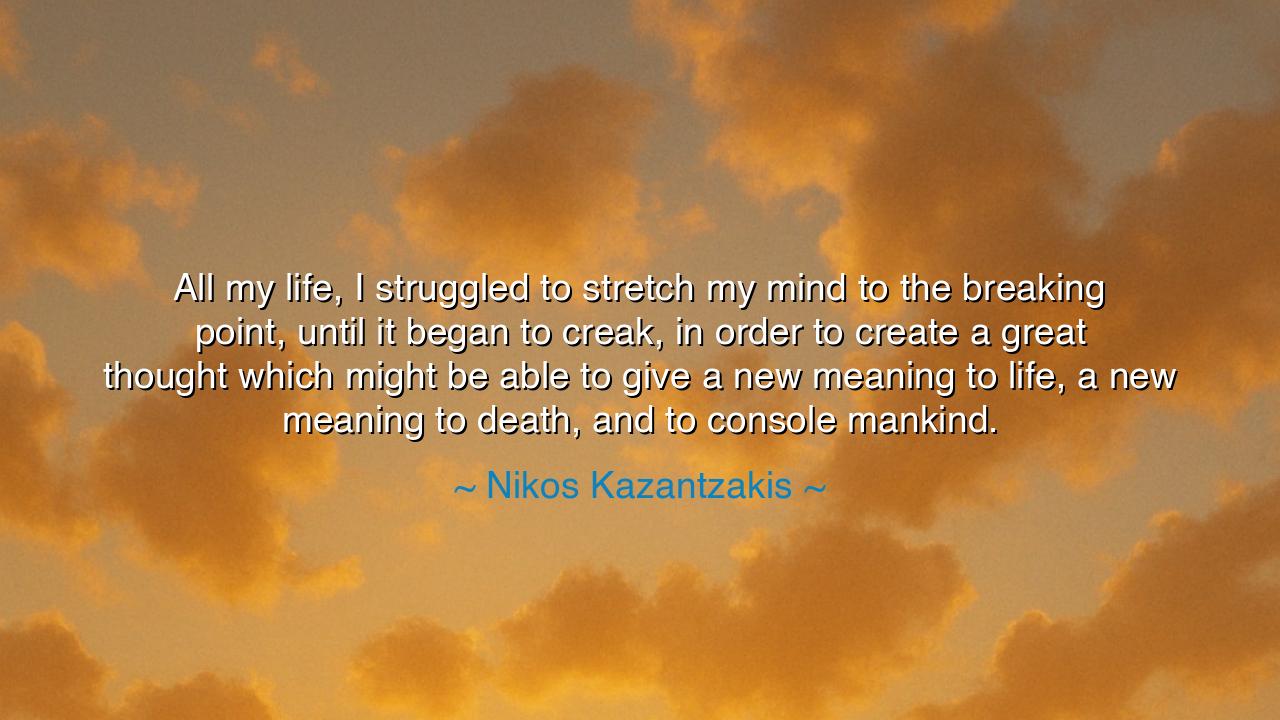
All my life, I struggled to stretch my mind to the breaking
All my life, I struggled to stretch my mind to the breaking point, until it began to creak, in order to create a great thought which might be able to give a new meaning to life, a new meaning to death, and to console mankind.






“All my life, I struggled to stretch my mind to the breaking point, until it began to creak, in order to create a great thought which might be able to give a new meaning to life, a new meaning to death, and to console mankind.” — so spoke Nikos Kazantzakis, the philosopher, the pilgrim of the human soul, whose words burn like sacred fire. In this confession lies the story of a man who wrestled not with the world, but with the infinite itself — who dared to lift his thoughts toward the heavens until his very spirit trembled under the strain. His is the voice of one who sought truth not as comfort, but as conquest — who longed to find in thought the bridge between life and death, despair and hope, mortal and divine.
Kazantzakis lived as a seeker in the truest sense. He was a man of unending intellectual hunger, restless before the silence of the universe. Born in Crete, a land steeped in myth and struggle, he inherited from his ancestors the warrior’s heart — but his battle was not fought with swords, only with questions. To “stretch the mind to the breaking point” is to challenge the boundaries of human understanding, to go beyond the safety of belief and face the raw immensity of existence. Like Prometheus who stole fire from the gods, Kazantzakis risked torment to bring light to his fellow men.
In his words, we hear both agony and exaltation. The “creak” of the mind he speaks of is the sound of a spirit straining against the limits of language and reason, reaching for what lies beyond. He was not content with the truths offered by tradition or comforted by the certainty of dogma. His was the path of those who question until questioning itself becomes a form of prayer. He sought not a single revelation, but an ever-deepening awareness, a vision vast enough to hold both the beauty and terror of existence.
The ancients, too, knew this sacred torment. Socrates, who spent his life asking unanswerable questions, said that philosophy begins in wonder — and wonder is both birth and pain. Buddha, before enlightenment, endured the hunger of both body and soul, seeking the meaning that would reconcile suffering and peace. Like them, Kazantzakis believed that wisdom is not found in ease, but in the crucible of spiritual struggle. To seek meaning in life and death, as he did, is to stand at the threshold of the abyss — and to refuse to turn away.
In his own works, such as Zorba the Greek and The Last Temptation of Christ, Kazantzakis explored this ceaseless striving. Through his characters, he gave voice to the paradox of human existence: that we are torn between the earth and the spirit, between joy and despair, between the desire to live and the inevitability of death. His longing to “console mankind” was not the shallow comfort of forgetting our mortality, but the deeper consolation of acceptance — the realization that our suffering, our yearning, and our love are all parts of a sacred whole. He sought a wisdom that would not erase pain, but give it purpose.
Consider the life of Michelangelo, who said, “I saw the angel in the marble and carved until I set him free.” Like Kazantzakis, he labored endlessly — his hands bleeding, his soul weary — to bring forth from stone the image of the divine. Each hammer strike was a prayer, each act of creation a rebellion against meaninglessness. So too did Kazantzakis chisel his thoughts from the granite of doubt, each word a blow against despair. Both men teach us that greatness — whether in art or philosophy — demands the courage to suffer for what one seeks to understand.
And so, my child, the lesson is this: do not fear the weight of your questions. Let your mind stretch, even to the point of breaking, for in that struggle lies your becoming. Seek meaning not in comfort, but in courage — not in certainty, but in wonder. The search for truth is not meant to end; it is the fire that keeps the soul alive. When you strive to understand life, you also begin to understand death; and when you give meaning to death, life itself becomes sacred.
As Nikos Kazantzakis teaches us, to think deeply is to love deeply — to wrestle with the divine until your heart, too, begins to creak under the weight of truth. And though you may never find the final answer, you will discover something far greater: the eternal flame of human spirit that refuses to be extinguished, the great thought that consoles not by solving life’s mystery, but by embracing it.






AAdministratorAdministrator
Welcome, honored guests. Please leave a comment, we will respond soon